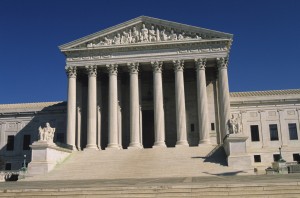 Yesterday, the United States Supreme Court voted to uphold the Patient Protection and Affordable Care Act (“PPACA”), the landmark health reform law enacted in 2010. The justices’ ruling in National Federation of Independent Business v Sebelius leaves intact nearly all of the provisions of the law (with the exception of an expansion of the Medicaid program), including a series of amendments to the False Claims Act (“FCA”) that entailed both procedural and substantive changes to the statute. In the wake of the Supreme Court decision, a review of the 2010 amendments to the FCA put into effect under the PPACA will help relators to understand the direct import of the landmark health care case to the likelihood of pressing ahead with a qui tam action under the FCA.
Yesterday, the United States Supreme Court voted to uphold the Patient Protection and Affordable Care Act (“PPACA”), the landmark health reform law enacted in 2010. The justices’ ruling in National Federation of Independent Business v Sebelius leaves intact nearly all of the provisions of the law (with the exception of an expansion of the Medicaid program), including a series of amendments to the False Claims Act (“FCA”) that entailed both procedural and substantive changes to the statute. In the wake of the Supreme Court decision, a review of the 2010 amendments to the FCA put into effect under the PPACA will help relators to understand the direct import of the landmark health care case to the likelihood of pressing ahead with a qui tam action under the FCA.
The FCA is a federal whistleblower statute that was passed in 1863 to mitigate the adverse impact of war profiteering on the federal treasury. The Act’s qui tam provisions allow whistleblowers (known as relators) to sue on behalf of the government for alleged fraud perpetrated against the government. At the heart of a successful qui tam action under the FCA is the submission of a “false claim” to the federal government, which typically involves false representations made in connection with payment from a government program or payment for performance under a contract with the government. In 1986, the Act underwent significant changes that widely expanded the number of actionable claims and lowered the barriers for relators to receive monetary awards for their participation in qui tam lawsuits. The statute allows the government to intervene in an action filed by a whistleblower, but even if the government does not intervene relators may proceed privately with their claims. Successful relators may recover between 15% and 30% of any settlement or final judgment.
In 2009, Congress passed the Fraud Enforcement and Recovery Act (“FERA”), a bill written to counteract the decisions of many federal courts to interpret the FCA in a narrow fashion that limited the types of fraud that gave rise to a qui tam suit. FERA was passed at the height of the financial crisis in 2008 in order to address the sorts of financial, securities, and mortgage-lending fraud that contributed to the panic. In 2010, the PPACA made several important changes to the FCA:
(1) Relaxation of the public disclosure bar: before 2010, the public disclosure bar was jurisdictional in nature. That meant the onus was on relators to demonstrate that there had been no public disclosure of the alleged fraud prior the filing of the qui tam claim, or else that they qualified as an “original source” of the fraud under the statute and thus should survive a public disclosure challenge. After the PPACA amendments, however, the public disclosure provision has been converted into an affirmative defense, placing the burden of proof on defendants. In addition, the new changes allow the United States the unqualified power to quell a public disclosure challenge by opposing it. In other words, it is now squarely in the hands of the federal government to decide whether a claim will be barred due to a public disclosure.
Furthermore, the 2010 amendments have constrained the definition of what constitutes a public disclosure. Only federal government reports, administrative hearings, civil and criminal hearings, audits, and investigations fall under the new definition. Actions filed by private parties and state government hearings and reports no longer qualify as public disclosures. As for the law’s “original source” exception to the public disclosure bar, the definition of “original source” has been widened to mean a relator who has knowledge that is “independent of and materially adds to the publicly disclosed allegations or transactions.” Notably, this amended definition of original source does not require “direct” or firsthand knowledge.
(2) The FCA now specifies a 60-day deadline by which Medicare and Medicaid over-payments must be returned upon being identified.
(3) Violations of the Medicare and Medicaid anti-kickback statute (“AKS”) are classified as false claims for the purposes of the FCA. This change came about in response to a number of courts that had declined to recognize violations of the AKS as actionable false claims for the purposes of the False Claims Act because the claims submitted for reimbursement did not expressly state that the claimant had complied with the federal anti-kickback statute. Consequently, relators will likely have a much higher probability of success in prosecuting qui tam actions under the FCA which involve physicians and pharmaceutical companies engaging in prohibited conduct under the AKS.
Taken together, the amendments to the FCA under the PPACA remove several important procedural and jurisdictional barriers that previously thwarted many otherwise-meritorious claims. In this manner, the FCA offers one important tool by which the federal government may go about the business of reducing health care inflation, by encouraging those with important information to come forward and participate in efforts to curb fraud and abuse in the health care sector.
 Whistleblower Attorneys Blog
Whistleblower Attorneys Blog

